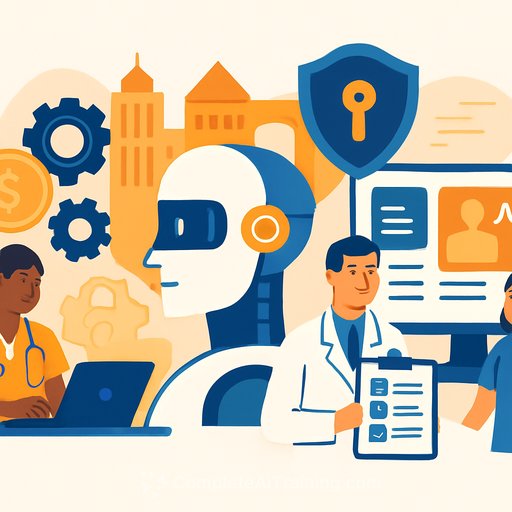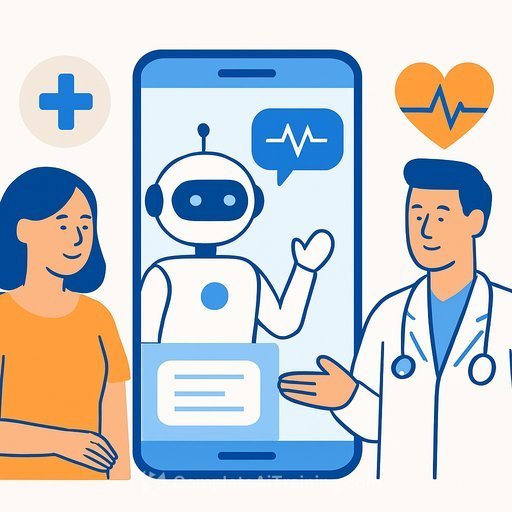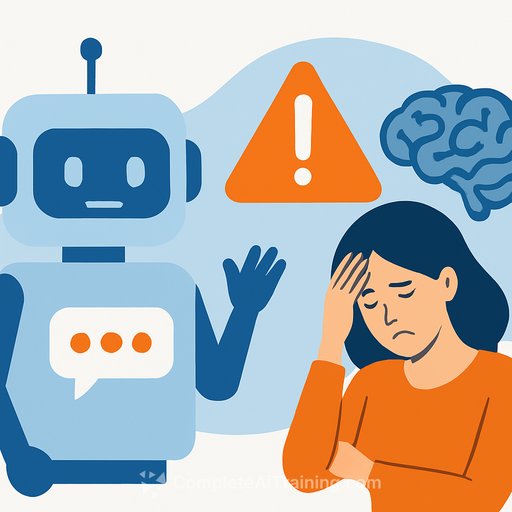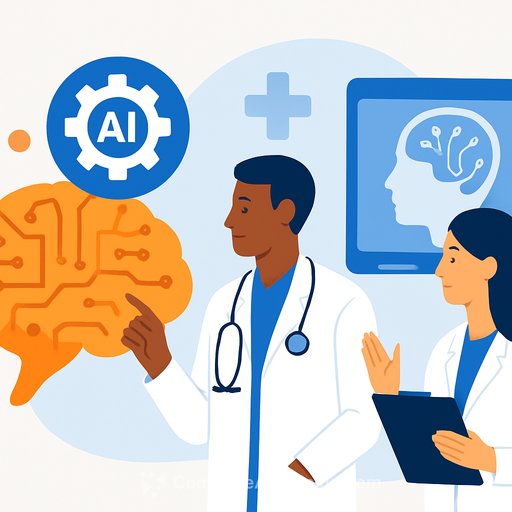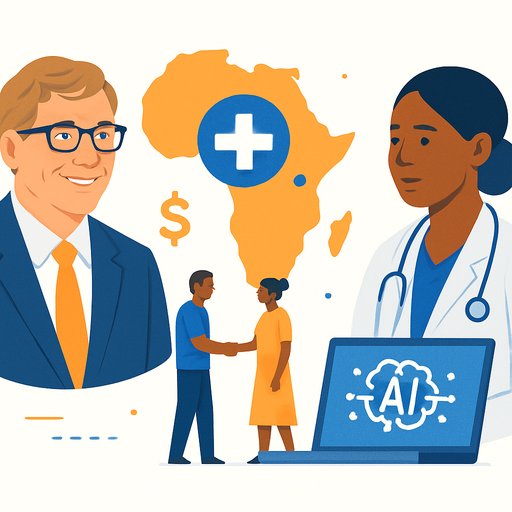The Complete Guide to Using AI in the Healthcare Industry in Chattanooga in 2025
Last Updated: August 15th, 2025
Quick Overview
In Chattanooga in 2025, AI helps reduce after-hours charting, speeds up triage and oncology biomarker decisions, and has processed 150 million oncology documents—about 70% of which were previously unanalyzed. Pilot projects typically cost between $10,000 and $50,000, while clinics invest from $30,000 to $150,000. The Tennessee Information Protection Act (TIPA), effective July 1, 2025, enforces vendor assessments and NIST-aligned controls.
AI matters because it cuts clinician paperwork, identifies high-risk patients earlier, personalizes treatment, and supports telemedicine and hospital-at-home models. Local reports confirm AI reduces after-hours charting and improves clinician-patient time. Policymakers are tightening rules on health data, pricing, and AI use, creating a patchwork that Tennessee providers must address. Proactive governance and vendor vetting are essential. For a practical start, check the Chattanooga 2025 Playbook, review state policy trends from Datavant, and explore workforce upskilling options like AI Essentials bootcamps.
How Will AI Be Used in Healthcare in 2025 in Chattanooga?
AI will be applied across imaging, electronic health records (EHR), and oncology workflows to speed diagnosis, reduce documentation burdens, and close care gaps. Neurologists already use AI to screen coronary CT scans and have piloted smartphone apps to accelerate stroke care. Oncology providers leverage real-time insights and trial matching powered by platforms like Ontada’s EHR tools and ON.Genuity to surface biomarker and staging data at the bedside.
Cloud AI and natural language processing (NLP) expand these capabilities. For example, Ontada’s Azure OpenAI implementation processed 150 million unstructured oncology documents in weeks, unlocking 70% previously unanalyzed data to accelerate care gap identification and product development. This results in faster triage and more detailed quality reporting, reducing admin overhead and improving community-based care.
Use Case Evidence
- Local imaging & stroke triage: AI aids coronary CT screening and smartphone stroke apps.
- Oncology data scale: 150M documents processed in ~3 weeks; 70% previously unanalyzed.
- Quality reporting: Practice Insights selected as a 2025 CMS QCDR to streamline MIPS reporting.
Where Is AI Used Most in Tennessee and Chattanooga Healthcare?
The highest AI concentration is in medical imaging, diagnostic laboratories, and EHR/NLP clinical workflows. Radiology tools accelerate reading of X-rays, CTs, and MRIs, becoming the primary route for hospital AI adoption. Lab automation and pathology AI speed sample processing and improve diagnostic accuracy across hospital networks and reference labs. EHR-integrated NLP and workflow tools highlight critical findings and trigger care coordination.
Top Areas of AI Use
- Medical imaging (radiology): AI accelerates X-ray, CT, MRI reads.
- Diagnostics & pathology labs: AI-driven lab automation and deep learning improve accuracy and throughput.
- EHR NLP & workflow: AI flagged ~5,000 lung nodules leading to 116 cancer detections and 64 treatments.
AI Tools & Vendors Relevant to Chattanooga Providers in 2025
Providers should prioritize vendors that integrate AI into clinical workflows and real-world data. Ontada offers oncology-focused EHR and analytics tools including iKnowMed, Clear Value Plus, Practice Insights, and the ON.Genuity platform, which processed 150 million unstructured oncology components with Microsoft.
McKesson’s Precision Care Companion bundles education, EHR integration, and genomic testing workflows, helping practices order and receive test results directly in the chart. For patient access, scheduling, and contact-center automation, Concentrix’s iX Hero uses agentic AI to consolidate data, summarize conversations, and reduce after-call work.
Key Vendors & Tools
- Ontada / ON.Genuity, iKnowMed: Oncology EHR and real-world data platform processing large oncology datasets.
- McKesson Precision Care Companion: EHR-integrated genomic test ordering and results workflow.
- Concentrix iX Hero: Agentic AI for contact centers, consolidating apps and reducing workload.
Three Ways AI Will Change Chattanooga Healthcare by 2030
- Precision oncology at point of care: Tools like McKesson’s companion will embed genomic test ordering and results directly into charts.
- Accelerated local research and trial matching: Real-world data and large-scale AI will speed adoption of targeted therapies.
- Operational efficiency: AI will reduce after-hours clinician charting and front-desk workload, allowing teams to see more patients and close follow-up loops.
Supporting Metrics
- 150 million unstructured oncology components processed.
- Coverage of 2.4 million+ patients and 2,700+ providers.
- Precision Care Companion deployed across the US Oncology Network (~2,750 providers).
How Much Does It Cost to Implement AI in Chattanooga Healthcare?
Costs depend on scale and scope. Entry pilots start around $10,000 to $50,000. Small clinics typically invest $30,000 to $150,000. Medium hospitals spend $150,000 to $750,000, while large health systems may exceed $1 million.
Typical Initial Investment by Organization Type
- Entry pilot / small project: $10,000 – $50,000
- Small clinic: $30,000 – $150,000
- Medium hospital: $150,000 – $750,000
- Large hospital network: $1,000,000 – $5,000,000+
Ethics, Privacy, and Data Governance in Chattanooga
2025 is a compliance milestone due to Tennessee’s Information Protection Act (TIPA), effective July 1, 2025. It adds state-level requirements alongside HIPAA. Key obligations include a 45-day window to respond to consumer requests, documented Data Protection Assessments for higher-risk processing, and strict limits on sensitive data collection.
TIPA Details
- Effective date: July 1, 2025
- Consumer request response time: 45 days
- Applicability: Businesses with >$25M revenue processing either 175,000 Tennessean records/year or 25,000+ records with ≥50% revenue from selling data.
Step-by-Step Roadmap for AI Adoption in Chattanooga Clinics and Hospitals
- Choose a pilot: Select one high-ROI, measurable workflow.
- Select vendors: Prioritize those embedding AI into EHR and real-world data pipelines.
- Run parallel validation: Compare AI suggestions against existing workflows.
- Governance: Require vendor Data Protection Assessments and NIST-aligned controls.
- Train a cross-functional team: Focus on rapid iteration and practical AI use.
- Schedule quarterly audits: Review accuracy, bias, and clinical impact before scaling.
Training, Workforce Change, and Community Outreach in Chattanooga
Building an AI-ready healthcare workforce involves practical upskilling and community outreach that connects residents with real jobs. The University of Tennessee at Chattanooga offers monthly AI masterclasses and an Industry Cohort program. A new Apprenticeship Innovation Hub uses AI to help employers find overlooked talent for work-based placements.
Programs & Funding
- EXPAND TN (UTC): $800,000 NSF award to train 120 high-school students.
- Hamilton County Career & Technical Center: $2 million state funding for a new downtown center.
- Volkswagen eLabs: Growth from 43 to 53 eLabs across Hamilton County Schools by 2026.
Conclusion: Next Steps for Chattanooga Healthcare Leaders
Start with a small, measurable pilot and a six-month validation plan. Require vendor Data Protection Assessments and NIST-aligned controls upfront. Invest in short, practical training to build AI fluency in clinical teams. Use early savings to fund further integration and scale.
Frequently Asked Questions
How is AI being used in Chattanooga healthcare in 2025?
AI is applied across imaging, EHR/NLP workflows, and oncology to speed diagnosis, reduce charting, identify high-risk patients earlier, and support telemedicine and hospital-at-home models.
Which healthcare areas in Tennessee and Chattanooga see the most AI use?
Medical imaging (radiology), diagnostic/pathology labs, and EHR-integrated NLP and workflow tools have the highest AI adoption.
What vendors and tools should Chattanooga providers consider in 2025?
Focus on vendors integrating AI with clinical workflows and real-world data, like Ontada, McKesson, and Concentrix.
How much does it typically cost to implement AI in a Chattanooga clinic or hospital?
Costs vary widely, from $10,000 for pilots to over $5 million for large health systems.
What governance, privacy, and workforce steps should Chattanooga leaders take now?
Map data flows, require vendor Data Protection Assessments, document NIST-aligned controls, and tighten processing agreements. For workforce, provide short, practical upskilling and apprenticeships to build clinical IT and data support capacity.
For healthcare professionals interested in practical AI skill-building, explore relevant courses at Complete AI Training.
Your membership also unlocks:

